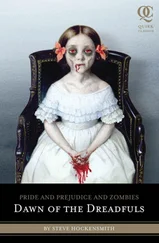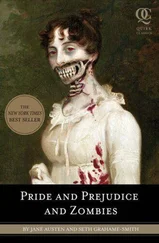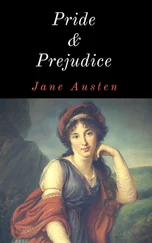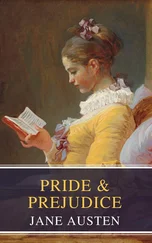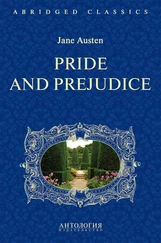Jane Austin - Pride and Prejudice
Здесь есть возможность читать онлайн «Jane Austin - Pride and Prejudice» — ознакомительный отрывок электронной книги совершенно бесплатно, а после прочтения отрывка купить полную версию. В некоторых случаях можно слушать аудио, скачать через торрент в формате fb2 и присутствует краткое содержание. Жанр: unrecognised, на немецком языке. Описание произведения, (предисловие) а так же отзывы посетителей доступны на портале библиотеки ЛибКат.
- Название:Pride and Prejudice
- Автор:
- Жанр:
- Год:неизвестен
- ISBN:нет данных
- Рейтинг книги:3 / 5. Голосов: 1
-
Избранное:Добавить в избранное
- Отзывы:
-
Ваша оценка:
- 60
- 1
- 2
- 3
- 4
- 5
Pride and Prejudice: краткое содержание, описание и аннотация
Предлагаем к чтению аннотацию, описание, краткое содержание или предисловие (зависит от того, что написал сам автор книги «Pride and Prejudice»). Если вы не нашли необходимую информацию о книге — напишите в комментариях, мы постараемся отыскать её.
Pride and Prejudice — читать онлайн ознакомительный отрывок
Ниже представлен текст книги, разбитый по страницам. Система сохранения места последней прочитанной страницы, позволяет с удобством читать онлайн бесплатно книгу «Pride and Prejudice», без необходимости каждый раз заново искать на чём Вы остановились. Поставьте закладку, и сможете в любой момент перейти на страницу, на которой закончили чтение.
Интервал:
Закладка:
protested that “he had never in his life witnessed such behaviour
in a person of rank—such affability and condescension, as he had
himself experienced from Lady Catherine. She had been graciously
pleased to approve of both of the discourses which he had already
had the honour of preaching before her. She had also asked him
twice to dine at Rosings, and had sent for him only the Saturday
before, to make up her pool of quadrille in the evening. Lady
Catherine was reckoned proud by many people he knew, but _he_ had
never seen anything but affability in her. She had always spoken
to him as she would to any other gentleman; she made not the
smallest objection to his joining in the society of the
neighbourhood nor to his leaving the parish occasionally for a
week or two, to visit his relations. She had even condescended to
advise him to marry as soon as he could, provided he chose with
discretion; and had once paid him a visit in his humble
parsonage, where she had perfectly approved all the alterations
he had been making, and had even vouchsafed to suggest some
herself—some shelves in the closet up stairs.”
“That is all very proper and civil, I am sure,” said Mrs. Bennet,
“and I dare say she is a very agreeable woman. It is a pity that
great ladies in general are not more like her. Does she live near
you, sir?”
“The garden in which stands my humble abode is separated only by
a lane from Rosings Park, her ladyship’s residence.”
“I think you said she was a widow, sir? Has she any family?”
“She has only one daughter, the heiress of Rosings, and of very
extensive property.”
“Ah!” said Mrs. Bennet, shaking her head, “then she is better off
than many girls. And what sort of young lady is she? Is she
handsome?”
“She is a most charming young lady indeed. Lady Catherine herself
says that, in point of true beauty, Miss de Bourgh is far
superior to the handsomest of her sex, because there is that in
her features which marks the young lady of distinguished birth.
She is unfortunately of a sickly constitution, which has
prevented her from making that progress in many accomplishments
which she could not have otherwise failed of, as I am informed by
the lady who superintended her education, and who still resides
with them. But she is perfectly amiable, and often condescends to
drive by my humble abode in her little phaeton and ponies.”
“Has she been presented? I do not remember her name among the
ladies at court.”
“Her indifferent state of health unhappily prevents her being in
town; and by that means, as I told Lady Catherine one day, has
deprived the British court of its brightest ornament. Her
ladyship seemed pleased with the idea; and you may imagine that I
am happy on every occasion to offer those little delicate
compliments which are always acceptable to ladies. I have more
than once observed to Lady Catherine, that her charming daughter
seemed born to be a duchess, and that the most elevated rank,
instead of giving her consequence, would be adorned by her. These
are the kind of little things which please her ladyship, and it
is a sort of attention which I conceive myself peculiarly bound
to pay.”
“You judge very properly,” said Mr. Bennet, “and it is happy for
you that you possess the talent of flattering with delicacy. May
I ask whether these pleasing attentions proceed from the impulse
of the moment, or are the result of previous study?”
“They arise chiefly from what is passing at the time, and though
I sometimes amuse myself with suggesting and arranging such
little elegant compliments as may be adapted to ordinary
occasions, I always wish to give them as unstudied an air as
possible.”
Mr. Bennet’s expectations were fully answered. His cousin was as
absurd as he had hoped, and he listened to him with the keenest
enjoyment, maintaining at the same time the most resolute
composure of countenance, and, except in an occasional glance at
Elizabeth, requiring no partner in his pleasure.
By tea-time, however, the dose had been enough, and Mr. Bennet
was glad to take his guest into the drawing-room again, and, when
tea was over, glad to invite him to read aloud to the ladies. Mr.
Collins readily assented, and a book was produced; but, on
beholding it (for everything announced it to be from a
circulating library), he started back, and begging pardon,
protested that he never read novels. Kitty stared at him, and
Lydia exclaimed. Other books were produced, and after some
deliberation he chose Fordyce’s Sermons. Lydia gaped as he opened
the volume, and before he had, with very monotonous solemnity,
read three pages, she interrupted him with:
“Do you know, mamma, that my uncle Phillips talks of turning away
Richard; and if he does, Colonel Forster will hire him. My aunt
told me so herself on Saturday. I shall walk to Meryton to-morrow
to hear more about it, and to ask when Mr. Denny comes back from
town.”
Lydia was bid by her two eldest sisters to hold her tongue; but
Mr. Collins, much offended, laid aside his book, and said:
“I have often observed how little young ladies are interested by
books of a serious stamp, though written solely for their
benefit. It amazes me, I confess; for, certainly, there can be
nothing so advantageous to them as instruction. But I will no
longer importune my young cousin.”
Then turning to Mr. Bennet, he offered himself as his antagonist
at backgammon. Mr. Bennet accepted the challenge, observing that
he acted very wisely in leaving the girls to their own trifling
amusements. Mrs. Bennet and her daughters apologised most civilly
for Lydia’s interruption, and promised that it should not occur
again, if he would resume his book; but Mr. Collins, after
assuring them that he bore his young cousin no ill-will, and
should never resent her behaviour as any affront, seated himself
at another table with Mr. Bennet, and prepared for backgammon.
Chapter 15
Mr. Collins was not a sensible man, and the deficiency of nature
had been but little assisted by education or society; the
greatest part of his life having been spent under the guidance of
an illiterate and miserly father; and though he belonged to one
of the universities, he had merely kept the necessary terms,
without forming at it any useful acquaintance. The subjection in
which his father had brought him up had given him originally
great humility of manner; but it was now a good deal counteracted
by the self-conceit of a weak head, living in retirement, and the
consequential feelings of early and unexpected prosperity. A
fortunate chance had recommended him to Lady Catherine de Bourgh
when the living of Hunsford was vacant; and the respect which he
felt for her high rank, and his veneration for her as his
patroness, mingling with a very good opinion of himself, of his
authority as a clergyman, and his right as a rector, made him
altogether a mixture of pride and obsequiousness, self-importance
and humility.
Having now a good house and a very sufficient income, he intended
to marry; and in seeking a reconciliation with the Longbourn
family he had a wife in view, as he meant to choose one of the
daughters, if he found them as handsome and amiable as they were
represented by common report. This was his plan of amends—of
Читать дальшеИнтервал:
Закладка:
Похожие книги на «Pride and Prejudice»
Представляем Вашему вниманию похожие книги на «Pride and Prejudice» списком для выбора. Мы отобрали схожую по названию и смыслу литературу в надежде предоставить читателям больше вариантов отыскать новые, интересные, ещё непрочитанные произведения.
Обсуждение, отзывы о книге «Pride and Prejudice» и просто собственные мнения читателей. Оставьте ваши комментарии, напишите, что Вы думаете о произведении, его смысле или главных героях. Укажите что конкретно понравилось, а что нет, и почему Вы так считаете.


